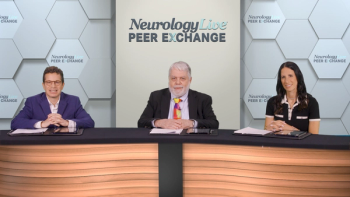Exploring Upstream Targets to Optimize Myasthenia Gravis Treatment

Panelists discuss how myasthenia gravis is a T-cell–dependent, B-cell–mediated autoimmune disorder affecting neuromuscular transmission through different autoantibodies (acetylcholine receptor, MuSK, and LRP4) that target the neuromuscular junction through various mechanisms including complement activation and receptor clustering disruption.

Panelists discuss how seronegative patients may still have undetectable antibodies and respond to plasma exchange, suggesting serum factors are involved. They require different diagnostic approaches, including cell-based assays and genetic testing, to differentiate between congenital myasthenia and other disorders.

Panelists discuss how myasthenia gravis presents as a “snowflake disease” with variable symptoms, typically starting with ocular manifestations and progressing differently based on antibody subtypes, with MuSK patients showing more severe bulbar and respiratory involvement. Antibody titers do not always correlate with disease severity.

Panelists discuss how myasthenia gravis creates substantial physical, social, and emotional burdens affecting work capacity, daily activities, and mental health. Fatigable weakness is often underestimated during clinical assessments, and disease burden does not always correlate with traditional severity classifications.

Panelists discuss how current treatment follows a stepwise approach starting with symptomatic therapy (pyridostigmine) and progressing to immunosuppressive agents (steroids and nonsteroidal immunosuppressants), with thymectomy for select patients and consideration of targeted therapies for refractory cases.

Panelists discuss how steroids, although effective, create significant treatment burden through immediate adverse effects such as GI issues and insomnia, long-term complications including bone loss and metabolic disorders, and the need for frequent monitoring and dose adjustments that impact both patients and health care providers.

Panelists discuss how FcRn inhibitors work by blocking antibody recycling pathways while complement inhibitors prevent membrane attack complex formation at the neuromuscular junction, with both classes showing transformative efficacy but requiring careful patient selection and safety monitoring.

Panelists discuss how different FcRn inhibitors vary in administration routes, dosing schedules, and adverse event profiles, with efgartigimod offering cyclical therapy while nipocalimab provides maintenance dosing. Patients may respond differently to various agents, requiring individualized treatment approaches.

Panelists discuss how the primary unmet needs include better treatments for seronegative and ocular-only patients, achieving minimal symptom expression in more than the current 45% to 50% of patients, and developing therapeutic biomarkers to guide personalized treatment selection.

Panelists discuss how inebilizumab in the MINT trial demonstrated efficacy in both acetylcholine receptor (AChR)– and MuSK antibody–positive patients with 6-month dosing intervals, successful steroid tapering during treatment, and the potential for upstream B-cell targeting to provide durable disease control.

Panelists discuss how treatment transitions are guided by shared decision-making between patients and providers, focusing on achieving minimal symptom expression, successful steroid tapering, and managing adverse events while considering early vaccination for complement inhibitor eligibility and personalized treatment approaches.

Panelists discuss how early treatment may protect the neuromuscular junction from permanent damage, prevent disease progression and crisis, and improve long-term outcomes. However, more data are needed from trials specifically studying patients with shorter disease duration rather than the typical average of 7 to 10 years.

Panelists discuss how the future of myasthenia gravis treatment will involve expanded use of targeted therapies, combination treatment approaches, oral therapeutic options, earlier intervention strategies, and the need for better economic data and updated guidelines to support optimal patient care.

Panelists discuss how emerging treatments include cladribine (oral B and T cell targeting), telitacicept (BAFF/APRIL inhibition), remibrutinib (BTK inhibition), POSI (combination complement inhibition), chimeric antigen receptor (CAR) T-cell therapies, and tolerance-inducing approaches that may offer more durable responses and potentially curative treatments.

Panelists discuss how successful myasthenia gravis management requires early diagnosis and treatment, active listening to understand individual patient needs, shared decision-making, aggressive use of targeted therapies to achieve minimal symptom expression, and comprehensive patient education to support optimal care outcomes.

